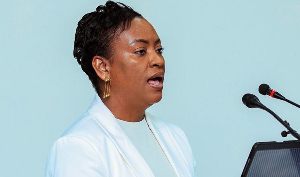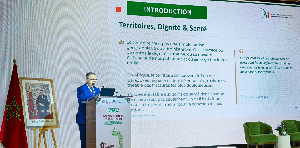Provisional outturn for 2001 indicates that overall fiscal balance was a deficit of 4.4 per cent of GDP.
This shows a better performance than the target deficit of 9.0 per cent of GDP and a deficit of 8.5 per cent in 2000, the Minister of Finance, Mr Yaw Osafo-Maafo, said on Thursday.
Presenting the budget for 2002 to Parliament he said the fiscal balance reflected total revenue and grants of ?8,476.8 billion and total expenditure of ?9,697.5 billion.
Domestic primary balance showed a surplus of ?1,639.0 billion, equivalent to 4.7 per cent of GDP. This also showed a better performance than the programmed balance of ?1,368.3 billion, equivalent to 3.6 per cent of GDP, and the 2000 outturn of 2.4 per cent of GDP.
Mr Osafo-Maafo said the high primary balance of 4.7 per cent of GDP was on account of estimated items in transit totalling ?243.8 billion, equivalent to 0.6 per cent of GDP.
"This float emanated from releases that were effected in December 2001, but which had not been debited to government account as at the time of reporting.
"For the sake of transparency, we have decided to include them in our expenditure report, since the funds have already been committed for those expenditure items.
"In effect, if the items in transit are taken into account, the domestic primary balance was 4.1 per cent of GDP."
Mr Osafo-Maafo said the exchange rate of the cedi was stable in both nominal and real terms against almost all the major currencies in the inter-bank and the forex bureaux markets.
"This was in contrast with the developments in 2000 when the cedi depreciated sharply and continuously against the major currencies," he said.
He said on the inter-bank market, the cedi to the US dollar exchange rate increased from ?7,049.73 at the end of December 2000 to ?7,312.24 at the end of December 2001, indicating a depreciation of only 3.7 per cent for the year. This was far lower than the depreciation of 49.5 per cent recorded for the corresponding period of 2000.
On the forex bureaux market, the cedi to the US dollar rate increased from ?6,800.00 at the end of December 2000 to ?7,322.73 at the end of December 2001, indicating a depreciation of 7.7 per cent. He said this was much lower than the 49.8 per cent recorded for the corresponding period of 2000.
Mr Osafo-Maafo said the reasons for the stability of the cedi exchange rate included the increased confidence of Ghanaians in the prudent financial policies of the government.
"Indeed the stabilisation has been achieved on the fiscal side by strictly limiting the government's borrowing requirements and on the monetary side by shifting its financing from bank to non-bank sources through co-ordinated open market operations."
The Minister said non-bank holdings of the government Treasury Bills increased from 37.4 per cent of total holdings at the end of December 2000 to 47.5 per cent by the end of December 2001.
In addition, the reduced demand for foreign exchange to service debts as a result of Ghana's HIPC declaration, as well as lower the government spending and money supply growth were contributory factors to the observed stability of the cedi exchange rate.
Mr Osafo-Maafo said the functioning of the foreign exchange market had improved markedly as monetary discipline had been restored and macroeconomic performance strengthened.
"The Bank of Ghana has maintained a policy of non-intervention in the exchange market and has made no foreign exchange sales to the market other than those for oil imports, allowing the exchange rate to be determined by market forces.












